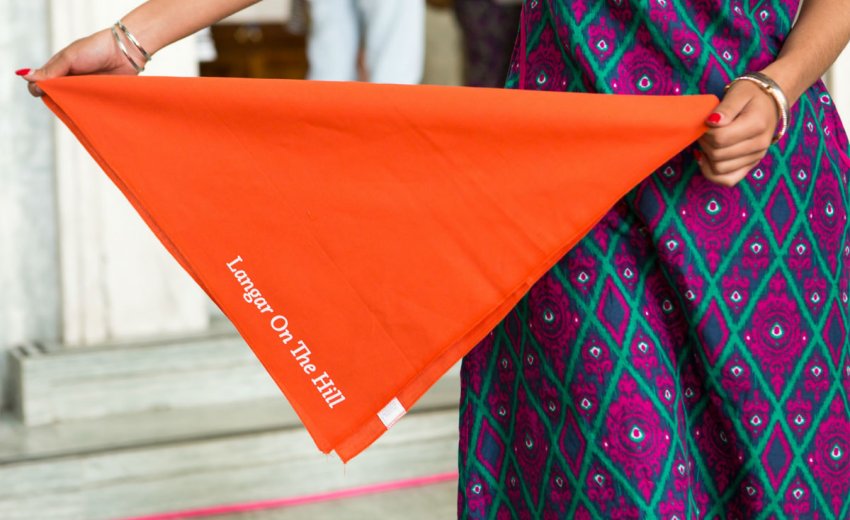While the week before August recess included some late nights for members of Congress, a few lawmakers and scores of staffers were able to take a break from the final votes to attend the first langar on Capitol Hill.
Langar is a 500-year-old tradition in the Sikh religion that emphasizes equality. Attendees sit on the floor and share the same meal, regardless of socioeconomic and racial divides.
“You hear about a faith, you hear about a set of values, but we want people to actually experience that and experience sitting next to whoever it is next to them, regardless of their background, and sharing a meal,” said Amrita Bamrah, one of the event’s organizers.
Bamrah, a recent graduate of the University of Illinois, is part of the SikhLEAD program that fosters young Sikh American leaders. While at the university, Bamrah organized a langar on campus that attracted 2,000 students. Her efforts inspired fellow SikhLEAD interns to host their own langar on the Hill.
SikhLEAD is part of the Sikh American Legal Defense and Education Fund, or SALDEF, which raises awareness and advocates on behalf of the Sikh American community.
According to SALDEF, Sikhism has been in the United States for 100 years and there are currently 700,000 Sikhs in America.
But Sikh Americans, particularly men who are easily identified by their turbans and long beards, often confront ignorance regarding their faith.
“The reason, also, that we’re holding this [langar] is not because there’s a misconception about Sikhism in the United States but because there’s a non-conception,” said Gurchit Singh Chatha, a SikhLEAD intern. “People just don’t know who we are. And so that’s a big issue that we’re trying to address.”
Chatha is interning in the office of Rep. Michael M. Honda and he worked with the California Democrat’s staff to bring the langar to the Hill.
An estimated 145 staffers and a handful of lawmakers attended the July 30 dinner. Upon entering the open foyer, attendees removed their shoes and donned orange scarves to cover their heads, both common practices when entering the gurdwara, a Sikh temple.
Attendees then proceeded to the meal, and packed their trays with lentils, potatoes and peas, yogurt and rice pudding. Trays in hand, the Hill workers moved to the floor and sat side-by-side on rugs, socializing and eating.
“You are making history,” Rep. Judy Chu, D-Calif., told the crowd. “You are participating in the very first langar on the Hill.”
Chu co-chairs the American Sikh Congressional Caucus along with Rep. David Valadao, R-Calif. During the dinner, Chu received the Dalip Singh Saund Award for her service to the Sikh community.
The award is named after the first Asian-American/Indian-American/Sikh American member of Congress. Saund, a Democrat, served in the House from 1956 to 1964. He died in 1973.
Saund is the only Sikh to serve in Congress thus far, though another Sikh American is hoping to follow in his footsteps.
Amar Kaleka is challenging Rep. Paul D. Ryan, R-Wis. Although Kaleka faces an uphill battle against the GOP’s 2012 vice presidential nominee, his political ambitions were motivated in part by a tragedy that rocked the Sikh community.
Kaleka’s father, Satwant Singh Kaleka, was killed in 2012 when a gunman opened fire at a Sikh temple in Oak Creek, Wis., as the worshipers prepared for langar. His father helped found the temple that became the site of the Aug. 5 massacre, which left six people dead.
The Capitol Hill langar occurred within days of the tragedy’s two-year anniversary. Chu told those gathered in the Rayburn foyer that Valadao and herself had once again introduced a congressional resolution commemorating the attack.
“This tragedy exemplifies that violent misunderstanding that Sikh Americans face in the wake of 9/11,” Chu said explaining the resolution. “We will keep on doing it every year on the anniversary of this tragedy because we will never let this nation forget what happened.”
For Sikh Americans, the massacre at Oak Creek highlighted the bigotry and ignorance they face on a daily basis in schools and in the work place.
After the tragedy, Rajdeep Singh, director of law and policy for the Sikh Coalition, worked closely with lawmakers to call on the FBI to track hate crimes against Sikhs. Singh continues to engage with Capitol Hill to advocate for issues important to the Sikh American community.
Other issues include asking the Department of the Defense to allow Sikhs to serve in the military.
Currently, military code does not allow for the turbans, uncut hair and beards that are central to the Sikh faith. “Now there’s an effort under way springing from the Hill to persuade DOD to modernize their appearance regulations,” said Singh.
Another issue at the center of the Sikh community’s advocacy involves school bullying. “A majority of Sikh children experience bullying and harassment at public schools,” said Singh, who said Honda and other lawmakers are circulating a letter to educate communities that bullying is a civil rights issue. “Our hope is that, over time, we won’t have to encounter hate crime and school bullying and bigotry of the sort that we’ve been experiencing in recent years.”
Though Sikh Americans engage with the Hill over these serious issues, last week’s langar was a time to enjoy their colleagues’ company and teach their fellow Hill staffers about their faith.
The 13 SikhLEAD interns spearheaded the effort to bring a langar to the Hill and SALDEF’s leaders beamed with pride at the young people who organized the historic event.
“They took the reins and organized this. It wasn’t even a project that we had fathomed,” said Jasjit Singh, executive director of SALDEF. “They brought it to us and said, ‘Can you support us?’ We said, ‘Absolutely!’”
Jasjit Singh said he hopes the langar on the Hill will become an annual event.
